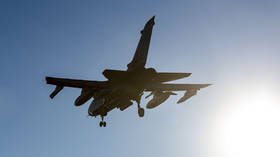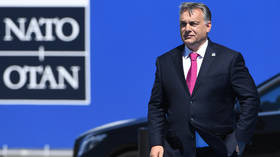US nukes in Poland would not be a deterrent, but a MASSIVE provocation for Russia

The US has promoted the deployment of US nuclear weapons on Polish soil as part of NATO’s ‘nuclear sharing’ arrangement. Such a move would only increase the chances of the very war such a deployment seeks to deter.
For the second time in little more than a year, the US ambassadors to Germany and Poland have commented on matters of NATO security in a manner which undermines the unity of the alliance while threatening European security by seeking to alter the balance of power in a way that is unduly provocative to Russia.
Richard Grenell, the US ambassador to Germany and the acting director of national intelligence, put matters into motion by writing an OpEd for the German newspaper Die Welt, criticizing politicians from within Chancellor Angela Merkel’s ruling coalition who were openly calling for the US to withdraw its nuclear weapons from German soil.
Adding fuel to the fire, the US ambassador to Poland, Georgette Mosbacher, tweeted out two days later that “If Germany wants to diminish nuclear capability and weaken NATO, perhaps Poland – which pays its fair share, understands the risks, and is on NATO’s eastern flank – could house the capabilities here.”
If Germany wants to diminish nuclear capability and weaken NATO, perhaps Poland - which pays its fair share, understands the risks, and is on NATO's eastern flank - could house the capabilities here: https://t.co/VIzpHIgoUN
— Georgette Mosbacher (@USAmbPoland) May 15, 2020
The action that provoked the Grenell-Mosbacher media blitz were comments made by Rolf Mützenich, the chairman of the Social Democratic Party in Germany’s parliament, calling for Germany to withdraw from its decades-old nuclear-sharing arrangement with NATO, noting that the deal had outlived its utility.
The US currently maintains a force of some 20 B-61 nuclear bombs on German soil, where they are earmarked for delivery by German aircraft during war. Since 1979, Germany has maintained a force of Tornado fighter-bombers dedicated to the nuclear-sharing mission. The decision by Germany to buy 30 US-manufactured F/A-18 Super Hornet aircraft to replace the Tornado in its nuclear delivery mission prompted Mützenich’s outburst.
Grenell and Mosbacher last teamed up to shake the foundations of NATO-based European security in September 2019, when Grenell’s comments made during the course of an interview with a German newspaper sparked controversy among German politicians sensitive to US criticism of German defense spending levels. “It is actually offensive to assume that the US taxpayer must continue to pay to have 50,000-plus Americans in Germany,” Grenell said, “but the Germans get to spend their surplus on domestic programs.”
Grenell’s comments were in the context of President Donald Trump’s ongoing insistence that America’s NATO allies pay their fair share of the cost of NATO by increasing their respective defense spending to levels matching two percent of their GDP. Germany’s defense budget in 2019 was approximately €43 billion, representing 1.2 percent of GDP. German lawmakers were quick to criticize Grenell’s comments, noting that while Germany’s defense expenditures were far short of what had been promised, it would not allow itself to be “blackmailed” by the US over matters relating to its national security.
Mosbacher then jumped into the controversy, tweeting“Poland meets its 2% of GDP spending obligation towards NATO. Germany does not. We would welcome American troops in Germany to come to Poland.”
Some left-wing German politicians proposed that Germany take Grenell up on his offer and begin to negotiate the withdrawal of US troops from German soil (there are some 52,000 Americans – 35,000 soldiers and 17,000 civilians – stationed in Germany today).
But these same politicians made a comment that has proved prescient. “If the Americans pull out their troops,” they noted, “then they should take their nuclear weapons with them. Take them home, of course, and not to Poland, which would be a dramatic escalation in relations to Russia.”
This, of course, is precisely what the Grenell-Mosbacher tag team has proposed today.
“NATO’s nuclear sharing,” the current NATO secretary general, Jens Stoltenberg, wrote in an OpEd published in the Frankfurter Allgemeine Zeitung, “is a multilateral arrangement that ensures the benefits, responsibilities and risks of nuclear deterrence are shared among allies.”
“Politically,” Stoltenberg said, “this is significant. It means that participating allies, like Germany, make joint decisions on nuclear policy and planning, and maintain appropriate equipment.”
Also on rt.com 3 heavyweights in the ring: As US-China hostility escalates, what role will be played by the world’s other great power, Russia?For its part, Russia has declared the US-NATO nuclear-sharing arrangement as operating in violation of relevant provisions of the Non-Proliferation Treaty (NPT) which prohibits the transfer by a nuclear weapons state of nuclear weapons to a non-nuclear weapons state. While the US challenges this Russian interpretation, the point is that the issue of NATO’s nuclear arsenal is an extremely sensitive one to Russia, made even more so when viewed in the context of the expansion of NATO that brought Poland and other eastern European countries into its fold.
Poland, along with the Czech Republic and Hungary, joined NATO in March of 1999, making a mockery of every assurance that had been given to the former Soviet president, Mikhail Gorbachev, that NATO would never expand eastwards if Germany were allowed to unify.
Russian President Vladimir Putin pointedly referred to these guarantees during his speech to the Munich Security Conference in February of 2007, in the context of NATO’s continued expansion. “[W]e have the right to ask: against whom is this expansion intended? And what happened to the assurances our western partners made after the dissolution of the Warsaw Pact? Where are those declarations today? No one even remembers them.”
Russia remembers. For example, on February 6, 1990, when the former West German foreign minister, Hans-Dietrich Genscher, met with then-British Foreign Minister Douglas Hurd, Genscher told Hurd that “The Russians must have some assurance that if, for example, the Polish Government left the Warsaw Pact one day, they would not join NATO the next.”
These assurances were made by the former US secretary of state, James Baker, to the former Soviet foreign minister, Eduard Shevardnadze, in February 1990, when Baker noted that before Germany could reunify, “There would, of course, have to be iron-clad guarantees that NATO’s jurisdiction or forces would not move eastward.”
These assurances were given, only to be violated during the administration of President Bill Clinton. Today, over 4,500 US troops are stationed on Polish soil, including a reinforced battalion-sized ‘battlegroup’ stationed along the so-called Suwalki Gap separating Poland from the Baltic nations.
“If Russian forces ever established control over the Suwalki region, or even threatened the free movement of NATO personnel and equipment through it, they would effectively cut the Baltic States off from the rest of the Alliance,” a NATO report written in 2018 noted. “Deterring any potential action – or even the threat of action – against Suwalki is therefore essential for NATO’s credibility and Western cohesion.”
For its part, Russia has repeatedly declared that it has no desire to enter a conflict with NATO. However, NATO’s expansion in Poland and other eastern European countries has increasingly placed Russian security interests at risk. The deployment of Aegis Ashore launchers onto Polish soil in an ostensible anti-missile role, while declared by NATO to be exclusively oriented toward protecting Europe from Iranian missiles, is viewed by Russia as a threat to its own strategic missile capability. In response, Russia has deployed nuclear-capable short-range missiles in its Kaliningrad exclave between Poland and Lithuania.
If NATO were to deploy nuclear weapons on Polish soil as part of any upgraded nuclear-sharing agreement, the threat to Russia would be intolerable – every launch of a Polish fighter-bomber would be seen as a potential existential threat, forcing Russia to increase its alert status along its western frontier, as well as its capability to rapidly neutralize such a threat should an actual war break out.
This does not mean that Russia would choose a preemptive nuclear attack – far from it. Instead, Russia would rely on the abilities of the front-line formations of its 1st Guards Tank Army and 20th Combined Arms Army to conduct deep penetration offensive operations designed to capture and/or destroy any forward-deployed nuclear weapons before they could be used. Far from deterring a war with Russia, any deployment of nuclear weapons by the US on Polish soil only increases the likelihood of the very conflict NATO purports to seek to avoid.
Think your friends would be interested? Share this story!
The statements, views and opinions expressed in this column are solely those of the author and do not necessarily represent those of RT.















